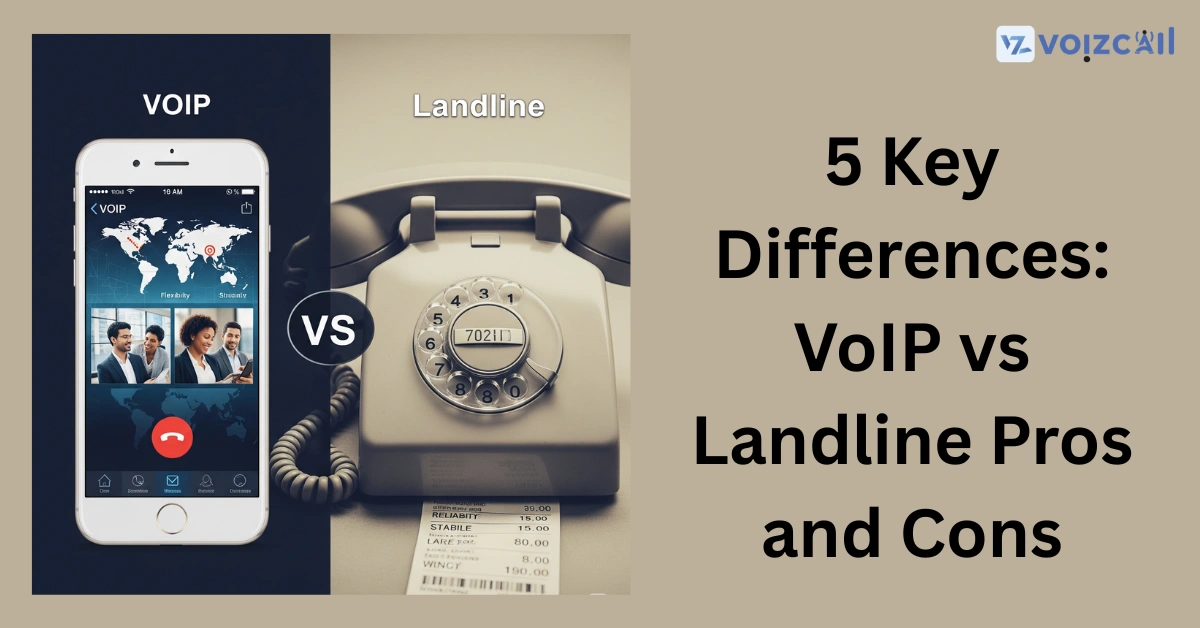


19/Jun/2025
Remember the days of dial tones and tangled phone cords? While landline phones were once the heart of every business and household, things have changed. Now, many people are asking:
What is the best solution: keep my landline or go to VoIP?
You might want to use voip in your small business, you might be wanting to run a cloud call center, maybe your small business is ranking up the fees on your landline, or you might just be wanting to cut the phone bills at home. This blog is going to take you through the real advantages and disadvantages of voip over landline-in plain words and real life examples.
Let us separate it further so that you can make the perfect decision that fits your needs.
VoIP What?? What is a Landline?
VoIP (Voice over Internet Protocol) is a telephone system operating on the internet. You make and receive calls using your broadband connection. Consider Skype, WhatsApp, or Zoom - on steroids.
Landline is an old fashioned phone which uses copper wires and your local phone company.
1. Technology: Internet vs Cables
VoIP:
VoIP makes use of the internet that you use to make a call. No wires, no fixed location. It is able to work on desks phones (VoIP), laptops, desktops or mobile phones.
Call / Email for Sales Inquiry Today
Best suited to: distributed workforces, cloud-based call centers and mobile users.
Landline:
Landlines rely on physical copper wire networks. It has good quality call lines but you cannot use it out of that area and there are no compromises.
Perfect in: zones with a low level of Internet or in cases when you simply need some simple and stable connection.
2. Cost: Pay for What You Use
VoIP Pros:
Cheaper monthly bills
Free long-distance or international calls in many cases
No separate phone line needed
Budget-friendly for small businesses
VoIP Cons:
Requires stable internet
Some advanced features may come with a subscription
Landline Pros:
Consistent call quality in areas with bad internet
Good for emergencies when the power is out
Landline Cons:
Higher monthly fees
Charges for long-distance calls
Extra cost for features like voicemail or caller ID
PBX systems that are moving to the cloud by businesses are usually done in an effort to save costs with the use of VoIP.
3. Features: Old vs New School
VoIP Features:
Call forwarding, voicemail-to-email, recording of calls
Action-attendants, virtual numbers, integrations via CRM
Works with softphones and apps
Ideal for cloud call centers and remote teams
Landline Features:
Basic call functionality (call, hold, transfer)
Voicemail (with extra charge)
Limited mobility
If you're running a modern business, VoIP wins big here. Especially if you're planning to move toward a cloud call center or flexible customer support setup.
4. Setup & Maintenance: Plug vs Power
VoIP:
You and anyone can call and receive calls anywhere in your phone, laptop or tablet. The ideal solution to work-at-home professionals, business road warriors, or cloud call centers.
Landline:
Requires physical installation
Maintenance is done by your telecom provider
Limited to office or home location
VoIP setup feels like setting up an app—fast and simple. Landline setup feels like waiting for a technician.
5. Mobility: Work from Anywhere or Stay Put?
VoIP:
You can make and receive calls from anywhere—your phone, laptop, or tablet. Perfect for remote workers, traveling professionals, or cloud call centers.
Landline:
You’re tied to one physical spot. No access outside the office or home unless you pay for expensive call forwarding services.
Quick Comparison Table: VoIP vs Landline
|
Feature |
VoIP (Internet-Based) |
Landline (Traditional) |
|
Call Quality |
Depends on internet |
Consistent, stable |
|
Setup Time |
Fast, remote setup |
Slower, technician required |
|
Mobility |
Anywhere, anytime |
Fixed location |
|
Monthly Cost |
Lower |
Higher |
|
Features |
Rich, modern features |
Basic, limited |
|
Integration |
CRM, call center tools |
Not possible |
Final Thoughts: So, Which One Should You Choose?
If you:
Want to cut costs
Need flexibility for remote or hybrid teams
Run a cloud call center or small business
Prefer modern features and app-like experiences
Then VoIP is your best bet.
But if:
You’re in an area with poor internet
You just want a basic, always-on line for emergencies
You don’t need advanced features
A landline may still serve you well—especially at home or in rural areas.
hosted VoIP solution
business phone system comparison